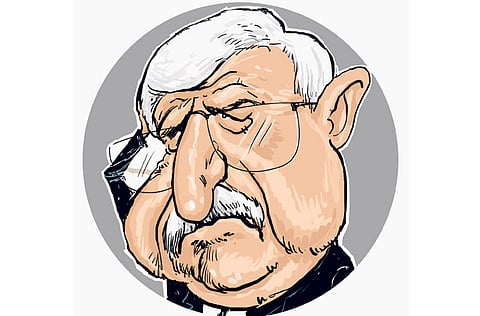Abbas could leave disastrous legacy
Hamas is concerned that the president of the Palestinian National Authority will sign a compromised peace deal

Palestinian National Authority President Mahmoud Abbas is sounding a lot like Egypt's Jamal Abdul Nasser did 43 years ago. Abbas is threatening to step down if the current talks with the Israelis fail, similar to how Nasser resigned when he led the Arab world to military defeat after the war of 1967. The only detail Abbas seems to miss is that when Nasser resigned, millions of Arabs spontaneously took to the streets, begging him to return to power. King Hussain of Jordan famously said that since Nasser had got the Arabs into the mess of 1967, "only Nasser can get us out!"
Deeply unpopular
Not the slightest bit of that applies to Abbas; who has unilaterally held onto power for more than one year after his constitutional term expired in 2009. This is the same man who has failed to hold legislative elections, who cancelled municipality elections, and has failed since 2007 to bring about reconciliation with Hamas, for the sake of uniting Palestinian territories and families. Abbas famously refused to accept the Palestinian street's vote for Hamas in 2006, when Fatah lost Gaza to Hamas, and pushed for postponement of the UN-mandated Goldstone Report one year ago, which accused Israel of war crimes in Gaza, before changing his mind. He recently marched into unpopular direct talks with the Israelis on September 2 with nothing to lean on for support except the goodwill of US President Barack Obama. Few would shed tears if Abbas resigned — and certainly not Hamas' leaders.
If Abbas keeps his word — which is highly unlikely — there are plenty of reasons to believe that he will be out of office by October. When the Palestinians agreed to enter into direct talks with the Israelis, they set a condition that the freeze on colony expansion in the West Bank should remain in place. That freeze is due to expire at midnight on September 30 and Israeli Premier Benjamin Netanyahu is toying with the idea of not extending it — or, at best, freezing horizontal rather than vertical expansion. In this case, colonies would continue to grow in size, but not in territory. If such a wild idea materialises, Abbas cannot but denounce it, echoing a position taken by Hamas, which has opposed the talks from day one. When the freeze was first discussed, Netanyahu made sure that it would end in September — prior to US congressional elections. He did this so that Obama would not dare to pressure him into another freeze, lest he upset Jewish voters, and financial backers.
But let us suppose, for the sake of argument, that Obama pressures Abbas into staying on board, even if colonies continue to expand, promising that expansion will cease when a final deal is signed on the White House lawn. Abbas would face significant challenges, such as the right of return of refugees, the future of occupied Jerusalem, the declaration of Palestinian statehood and the unification of Gaza and the West Bank.
Another significant stumbling block stems from the new Israeli demand, devised by Likud ministers, that the Palestinians recognise Israel as a "Jewish state". In The Godfather, Marlon Brando coined the phrase "make them an offer they cannot refuse". Netanyahu is putting a new twist on the Hollywood phrase, making it "an offer they cannot but refuse". No nation in the world is recognised by another nation — certainly not with all the history of the Arab-Israeli conflict — as anything in particular. In fact, recognising Israel as a Jewish state would make non-Jewish residents of Israel (one million Palestinians) second class citizens or non-entities.
The Arab League has said no to such a demand, and so has Abbas and Khalid Mesha'al, head of the political arm of Hamas, who was in Saudi Arabia when the talks started, performing Umrah. Mesha'al is very pessimistic about the talks, believing that the Obama administration is trying to "manage the conflict rather than resolve it". But, deep inside, he fears that at curtain fall Abbas might cave into US pressure and sign a flawed deal that whoever succeeds him as head of the PNA will inherit.
Picking up the pieces
Hamas leaders have for years had their eyes on the post that Abbas should have abdicated in 2009. It took them 15 years to digest the Oslo Accords, which they still consider a mistake, but nevertheless used to take power in parliament in 2006. They worked hard to transform from military warriors into pragmatic statesmen who accept the borders of 1967, who do not oppose the Arab Peace Initiative, and who agree to US mediation of the peace talks — "if Palestinian demands are respected and fulfilled". They know — as does Abbas — that the president's political days are numbered. If his legacy is a flawed peace deal — on refugees or occupied Jerusalem, for example — then Hamas will have to pick up the pieces.
If Hamas wants to replace Abbas, it has to respect agreements signed with Israel. Saying no to Abbas' deal, whatever it might be, would only bring Hamas back to square one — isolated and at odds with the international community. Hamas, through soft and low-profile diplomacy, is thereby trying to prevent a catastrophe before it happens.
Sami Moubayed is editor-in-chief of Forward Magazine in Syria.


